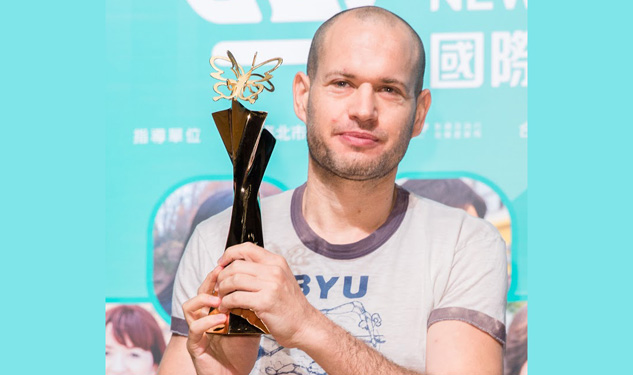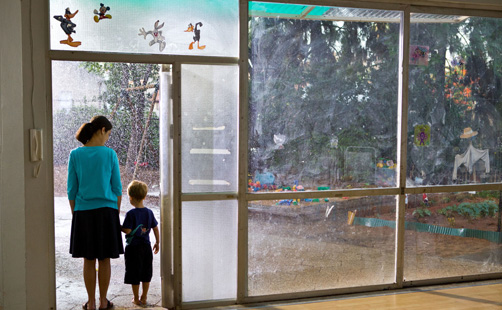
- Awards
Nadav Lapid – A Filmmaker On The Rise
Israeli director Nadav Lapid’s The Kindergaten Teacher won the International New Talent Award at the 17th Taipei Film Festival. The HFPA’s Barbara Gasser met with the emerging director at the festival to discuss cinema, poetry and the power of recognition.
With only two feature films under his belt, 39-year-old Nadav Lapid has emerged as one of the strongest new Israeli talents. In 2011 Lapid debuted with Policeman, followed by the critically acclaimed The Kindergarten Teacher, about a teacher who discovers a poet amongst her young pupils, only to become obsessed by him. A co-production of Israel and France, The Kindergarten Teacher, according to Lapid, took three years in the making, at a cost of approximately one million dollars.
Lapid continues on his quest to, in his words, “make deep, meaningful movies our society needs to see”. We met Lapid after his victory in the International New Talent Competition.
You just won the International New Talent Competition at the 17th Taipei Film Festival. Since the opening in Cannes last year The Kindergarten Teacher has travelled around the world. How important is recognition for you?
Nadav Lapid: It is my first time in Taipei and the great thing about international competition is that the outcome is unpredictable. Film, per se, is very subjective. While one loves this film, another person roots for a different movie. Recognition always makes you feel good. Without a doubt Cannes was a very decisive moment for The Kindergarten Teacher. Not only because it is the most famous Film Festival in the world, but also because a movie gets smashed or hyped. To have people come up to me and say, “I saw your movie” or have friends tell me that they heard people talk about The Kindergarten Teacher means a lot to me because, as a filmmaker, I consider it a huge compliment when the movie opens for a conversation. The worst would be if nobody wants to see or talk about my movie.
In what way is The Kindergarten Teacher autobiographical?
Nadav Lapid: Like the boy in The Kindergarten Teacher, I would declare “I have a poem, I have a poem” and dictate over 100 poems to my nanny, “Hagar” which is used in the movie, was dedicated to the older sister of a friend, and I fell in love with it. I was 4 years old and she was 7½. At the age of 6 1/2 I quit because I did not see a future as poet. Also, in poetry you expose yourself and your sensitivity. In Israel, masculinity and manhood are strong topics. Real heroes go to war and don’t write poems. I realized you cannot be both. So I quit and started to dream about becoming a heroic soldier. The parting poem in The Kindergarten Teacher is also the last poem I wrote in real life.
How do you see the status of poetry in our society?
Nadav Lapid: In the case of The Kindergarten Teacher, poetry is portrayed as a lost art. Poems are about mankind, a reflection of our history as human beings but in a very personal way. Like any art form, poetry has the power to influence or change a person’s attitude, and even his or her life.
The role of the boy Yoav has a rare complexity to it. What was your experience working with children?
Nadav Lapid: The role is indeed very complex and, therefore, it was important for me to set up a Kindergarten a few weeks before shooting, and they really enjoyed playing with each other. The challenge was to find a boy who is optically very cute and is adorable when he recites poems. On the other hand, there is something about him, when he takes over control and dominates the situation, which critics compared to The Shining.
Your directing style also seems to be influenced by Stanley Kubrick, who are the directors that you look up to?
Nadav Lapid: He is one of the directors I look up to, but there are many more. I am a huge fan of cinema and constantly watch movies, which means I have thousands of people that influence me.
As a director how would you describe your style? What elements are important to you?
Nadav Lapid: A clear visual sense is key. I don’t use any technical terms – instead I provide feelings and emotions for each scene. This helps not to lose focus on what the scene you are about to shoot is about because technical terms can get in the way of emotion. In my opinion, directing is a declaration.
In which way has your style and process of film making changed since your first film, Policeman?
Nadav Lapid: I appreciate more and more the cinematic liberty which has decreased over the years. My process has not changed that much. I consider myself very prepared. I create a thousand possibilities of shooting, then erase them all and create new ones. I want to dive in as deep as possible in exploring the subject – on the other hand I cherish creative liberty. So, finding the balance is crucial and causes interesting tensions.
Since you also write your own scripts, how much do you stick to the script and how much improvisation do you allow?
Nadav Lapid: I am staying loyal to the script and there are no improvisations. However I don’t storyboard the script because I am the worst painter in the world. The way I see it, the script is the story and the style of shooting is the spirit of text.
What will be your next film about?
Nadav Lapid: I am writing about an Israeli moving to Paris, stopping being Israeli and becoming French. I lived in Paris for several years, I reside in Israel but nowadays I live more in airports.
So your next film will be autobiographical as well.
Nadav Lapid: That´s what you said.
What is your personal goal as a filmmaker?
Nadav Lapid: I am an ambitious filmmaker and I will continue to write about issues I consider relevant and make movies about topics that I feel our world needs to see.
Barbara Gasser
Scene from The Kindergaten Teacher

